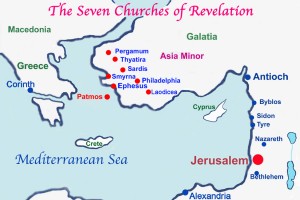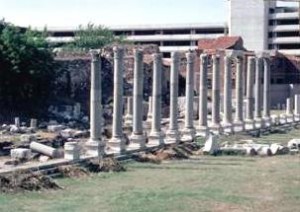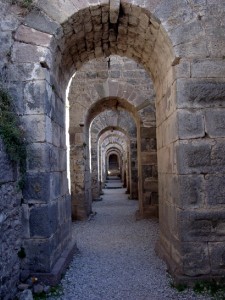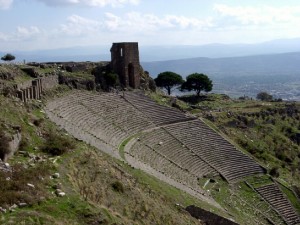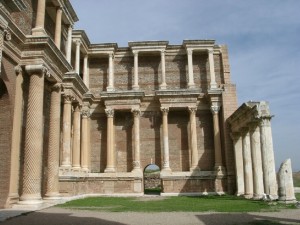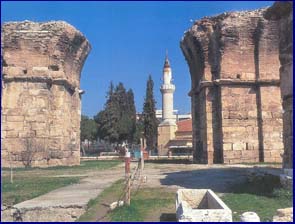Reflections on a Pauline Pilgrimage to Turkey [9]
“He who has an ear, let him hear what the Spirit says to the churches.” [Revelation 2:7,11,17,29; 3:6,13,22].
[1] Locations of the Seven Churches of Revelation in western Turkey. [2] Ruins of Smyrna Agora. [3] Pergamum ruins.
In a Pauline pilgrimage like ours, it was such a blessing that we could visit the sites of all the seven churches of Revelation. Within the time that we had, it was inevitable that we could not spend very much time in all the locations. In each case, however, no matter how hard pressed for time we might be, we made it a point to at least pause for a while, read the relevant message from chapters two and three of the Book of Revelation, and did some quiet reflection.
Those messages paint for us the characteristics of the seven churches of God that will exist in the end of the age. They contain serious reprimands and dire warnings of severe correction of the elect of God by Jesus Christ. And each of the seven messages ends with the following admonition: “He who has an ear, let him hear what the Spirit says to the churches” [Revelation 2:7,11,17,29; 3:6,13,22].
To the question “Are the warnings to Revelation’s Seven Churches relevant to us today?”, the answer is a definitive “yes”. St Paul hit the bull’s eye when he wrote to Timothy: “All Scripture is inspired by God and profitable for teaching, for reproof, for correction, and for training in righteousness” [2 Timothy 3:16]. If anything, a pilgrimage heightens one’s spiritual sensitivity. It is so much easier to grieve over the sins of the world, beginning with one’s own. In the present situation in which the Church finds itself, plagued as it is by immense crises, we put ourselves in serious peril if we still refuse to listen to what the Spirit is saying.
We have so far covered three of the seven churches named in Revelations 1-3. The remaining four do not get a mention outside of the Book of Revelations. There is, then, no record of St Paul having been to any of these four ancient cities. We now take a quick look at what the Spirit is saying to these four churches.
The Church in Smyrna
Amongst the seven churches of Revelation, the Church in Smyrna is the church that will suffer persecution [2:8-11].
The Lord knows that there are elects in Smyrna who try to do things right. Their faith will be severely tested, meeting crushing tribulations and real destitution, and some suffering imprisonment and even martyrdom. There are others who claim to belong to the group of converts, but in truth they belong to Satan. They will cause internal strife. Yet the Lord calls for perseverance in faith and promises thus: “Be faithful unto death, and I will give you the crown of life” [Rev 2:10].
- Christians in many countries may be experiencing difficulties in their work of evangelization. They may be harassed and their faith and religious exercise may even be under attack. But all that does not amount to persecution. Real persecution is seen in places where naming the name of Jesus may get you arrested, and you can be thrown into prison simply because you have declared Jesus Christ to be your Lord and Saviour. This ought to be serious food for thought for us who live in our comfort zones, refusing to go to church on the slightest excuse. Smyrna always serves as a timely reminder to the Church, and to every member who makes up the body that forms the Church, with regards to our spiritual condition. Are we in a place too nice and comfy to bother to get up and be counted? If we are arrested on the charge of being a follower of Christ, will there be evidence to convict us?
The Church in Pergamum
The Church in Pergamum is the corrupt church that needs to repent in Revelation 2:12-17. Pergamum was a centre of Caesar worship for the whole province. People were required to worship on pain of death, hence “Satan’s seat”. While the church there does hold fast to Christ’s name and does not deny his faith, and one in their group was even martyred, some members “hold the teaching of Balaam, who taught Balak to put a stumbling block before the sons of Israel, that they might eat food sacrificed to idols and practice immorality.” Some also hold the teaching of the Nicolaitans detested by the Lord [Rev 2:14-15]. Serious actions must be taken. The Church there must repent before it is too late. Those with an attitude of compromise concerning the truth of God during the time just prior to his return will find themselves at war with him.
- Churches today must examine themselves, lest they claim to be Christian but in reality seriously compromise the teaching of Christ in their very life. Christians worldwide are deeply disillusioned as they perceive in horror how words and deeds have become so colossally disproportionate. With attitude akin to that of Pergamum, division over what is right and wrong will continue to cause great turmoil in the Church. Sexual immorality, financial mismanagement, insistence on titles and privileges and lording over the common people, discrimination against women, lack of a proper sense of justice and righteousness, refusing to be upright and accountable – all these and more, are serious charges against the institutional church. And yet, do we have eyes that will truly see, ears that will really hear, and hearts that will humbly listen to what the Spirit is saying? Do we have the courage to stand up and say “no” to evil within the Church?
The Church in Sardis
[1] Pergamum ruins. [2] Sardis ruins. [3] Philadelphia ruins showing pillars of a massive church of Byzantine architecture.
The church in Sardis is the dead church in Revelation 3:1-6. The picture is pretty stark black-and-white. There are faithful Christians in Sardis whom the Lord considers to be “watchful”, who “overcome” evil and “hold fast”. These are the ones whom the Lord promises “shall be clothed in white garments” and have their names inscribed in “the Book of Life”. But the rest “have the name of being alive, and are dead”. They need to hold fast, repent and keep watch. Their salvation is at stake.
- We do not become spiritually “dead” over night. Sin is a weakness, a compromise in life. But when the same sin is repeated, it becomes increasingly easier to live with, until it reaches a point of self-delusion and becomes an acceptable way of life. Then, with this spiritually dead attitude of Sardis, one may no longer believe that the wages of sin brings eternal death that St Paul wrote about [Romans 6:23]. So the message to the church in Sardis renders a stark warning to us today of the dire spiritual consequences of falling asleep instead of being watchful. Churches today must wake up and not compromise the doctrine of salvation through the Cross of Christ. In no wise shall they preach that simply because someone is baptized and named a “Christian”, that he is saved. The message to Sardis is saying: “Wake up! Be warned! The little truth you have is slipping away and you are in danger of losing your salvation.” Christians are expected not to defile their garments of baptism and remain steadfast in their faith. If they have departed from the truth but are willing to repent, Christ will show mercy. Otherwise, the Lord will come upon them, at an hour they do not expect, and whatever righteousness they think they possess by virtue of baptism will be taken from them [Luke 19:26].
The Church in Philadelphia
Philadelphia is the faithful church, enduring patiently [Revelation 3:7-13]. Having kept the Lord’s command to persevere, Philadephia will be saved from the hour of trial which shall come upon the whole world. Christ refers to himself as holy and true. He is Holy, being sanctified by God to be Saviour of the nations. He is True, being “the Way, the Truth, and the Life” [John 14:6]. He is the Word and the “Word is truth” [John 17:17]. Those who falsely claim to be Jews, but are actually of the “synagogue of Satan,” will be judged.
- The Church in Philadelphia teaches us about spirituality. She exemplifies a threefold obedience, namely, spotting a little power, keeping Christ’s word, and not having denied His name [Rev 3:8]. They may have a little strength, little status and little influence, their resources and number may be small, but they are faithful to God and his plan for the salvation of the world. They keep God’s word and they try to practice the kind of endurance Jesus Christ has endured. They do not and will not compromise. Life is tough but perseverance is their key, keeping firmly in mind God’s vision for them, for the Church and for the world. There is no genuine spirituality that does not require some struggle and sacrifice. How can we know a faith is authentic if it has not been tested and subjected to trials? The Philadelphian spirit teaches that those are blessed who have weathered the storms of life and emerged like the Lord himself with scars and wounds to show for their struggles. Having clung to the Cross, they shall be rewarded just as St Paul has aspired – to be good soldiers of Christ Jesus [2 Timothy 2:3].
Then different situations and characters of the four churches take us to a point of our reflection where we must see that God calls his people to serve in different ways. He watches and he sees how we each seize the opportunity to serve him. Imagine everyone being assigned our own little patch of grass by God. He wants us to feed well, live well and act well in our respective patches of grass.
While the messages to the churches of the revelation carry serious reprimands, they also offer generous hope and encouragement. While death and dishonour await those who do not heed God’s warnings, eternal life awaits those who do. While God warns, he also resonates love, grace and hope.
- While the messages to the churches of the revelation carry serious reprimands, they also offer generous hope and encouragement.
- While death and dishonour await those who do not heed God’s warnings, eternal life awaits those who do.
- While God warns, he also resonates love, grace and hope.
“He who has an ear, let him hear what the Spirit says to the churches.”
Copyright © Dr. Jeffrey & Angie Goh, October, 2011. All rights reserved.
You are most welcome to respond to this post. Email your comments to us at jeffangiegoh@gmail.com. You can also be dialogue partners in this Ephphatha Coffee-Corner Ministry by sending us questions for discussion.

